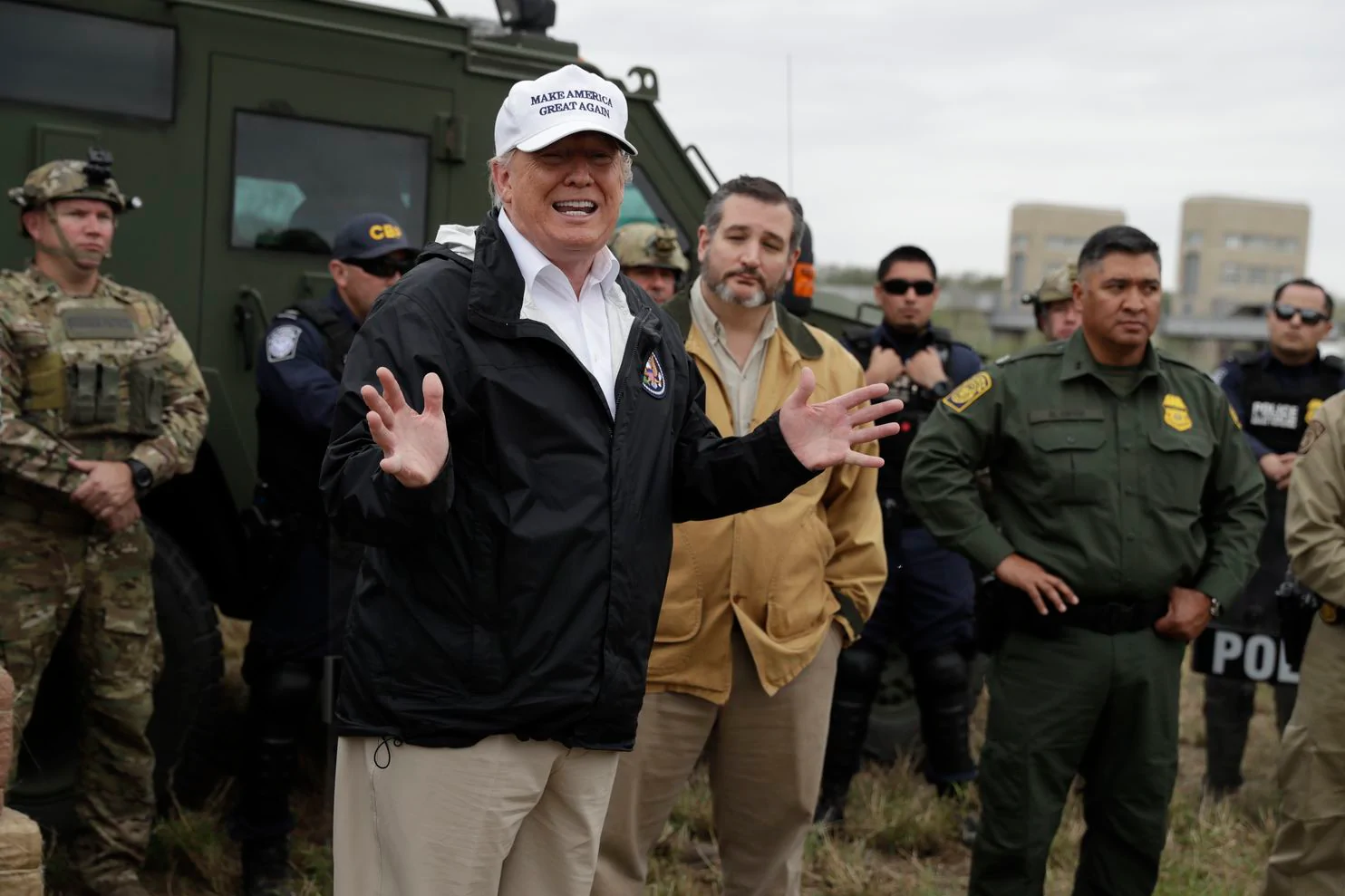| 轉貼:Trump has conjured a crisis out of thin air. |
| 送交者: 求真知 2019年01月16日22:09:10 於 [天下論壇] 發送悄悄話 |
|
Trump has conjured a crisis out of thin air. That should worry us all.
President Trump speaks to the media as he tours the U.S. border with Mexico at the Rio Grande on Jan. 10 in McAllen, Tex. (Evan Vucci/AP)
Columnist January 10 Watching the struggle over funding for a border wall, I am struck by the way in which, in one sense, President Trump has already achieved success. He has been able to conjure up a crisis out of thin air, elevate this manufactured emergency to national attention, paralyze the government and perhaps even invoke warlike authority and bypass Congress. He may still fail, but it should worry us that a president — any president — can do what Trump has done. Let’s be clear: There is no crisis. The number of undocumented immigrants in the United States has been declining for a decade. The number of people caught trying to sneak across the southern border has been on a downward trend for almost 20 years and is lower than it was in 1973. As has often been pointed out, far more people are coming to the U.S. legally and then overstaying their visas than are crossing the southern border illegally. But it’s important to put these numbers in context. More than 52 million foreigners entered the U.S. legally in fiscal year 2017. Of this cohort, 98.7 percent left on time and in accordance with their visas. A large portion of those remaining left after a brief overstay, and the best government estimate is that maybe 0.8 percent of those who entered the country in 2017 had stayed on by mid-2018. As for terrorism, the Cato Institute has found that, from 1975 to 2017, “there have been zero people murdered or injured in terror attacks committed by illegal border crossers on U.S. soil.” As for drugs, the greatest danger comes from fentanyl and fentanyl-like substances, which are at the heart of the opioid crisis. Most of this comes from China, either shipped directly to the United States or smuggled through Canada or Mexico. Trump has addressed the root of this problem by pressing the Chinese government to crack down on fentanyl exports, a far more effective strategy than building a physical barrier along the Mexican border. Even the Drug Enforcement Administration acknowledged in a report last year that while the southern border is the conduit for most of the heroin entering the United States, the drug typically comes through legal points of entry, hidden in cars or mixed in with other goods in tractor-trailers. In other words, a wall would do little to stanch the flow. And yet, the power of the presidency is such that Trump has been able to place this issue center-stage, shut down the government, force television networks to run an error-ridden, scaremongering Oval Office address, and now perhaps invoke emergency powers. This sounds like something that would be done by Presidents Vladimir Putin, Recep Tayyip Erdogan or Abdel Fatah al-Sissi, not the head of the world’s leading constitutional republic. When the U.S. government has created this sense of emergency and crisis in the past, it has almost always been to frighten people, expand presidential powers and muzzle opposition. From the Alien and Sedition Acts to the Red Scare to warnings about Saddam Hussein’s arsenal, the United States has experienced periods of paranoia and foolishness. We look back on them and recognize that the problems were not nearly as grave, the enemy was not nearly as strong and the United States was actually far more secure. The actions taken — suspending civil rights, interning U.S. citizens and noncitizens of Japanese descent, taking the nation to war — were almost always terrible mistakes, often with disastrous long-term consequences. And yet, presidential powers have kept expanding. Modern media culture has made it easier for presidents to set the agenda, because the White House is a central and perpetual point of focus and now receives far more attention than it ever had. Trump has managed to use this reality and turn good news into bad, turn security into danger and almost single-handedly fabricate a national crisis where there is none. This whole episode highlights a problem that has become apparent in these past two years. The U.S. president has too many powers, formal and informal. This was not intended by the founders, who made Congress the dominant branch of government, and it is not how the country has been governed for much of its history. But over the past nine decades, the presidency has grown in formal and informal authority. I have been an advocate of a strong executive for most of my life. I don’t much like how Congress operates. I now realize that my views were premised on the assumption that the president would operate within the bounds of laws, norms and ethics. I now believe that an urgent task for the next few years is for Congress to write laws that explicitly limit and check the powers of the president. I would take polarization over Putinism any day. |
|
|
|
|
 |
 |
| 實用資訊 | |
|
|
|
|
| 一周點擊熱帖 | 更多>> |
|
|
|
| 一周回復熱帖 |
|
|
|
|
| 歷史上的今天:回復熱帖 |
| 2018: | 誰是大躍進以及餓死人的罪魁禍首:趙紫 | |
| 2018: | 從“文革”到反腐敗 | |
| 2017: | 文革一日戛然而止:周強講話被收回 | |
| 2017: | 老猿:中國古代的四大文化惡人 | |
| 2016: | 蔡英文當選將為習近平開創宏偉大業搭建 | |
| 2016: | 幼河:我不承認中共政權 | |
| 2015: | 余不潔:習近平和蔣經國有可比性嗎? | |
| 2015: | 老張:由姚貝娜去世想到的 | |
| 2014: | 香椿樹:宋彬彬道歉與文革的秘密 | |
| 2014: | 視頻:看看誰是美國主人!美國是“民主 | |





